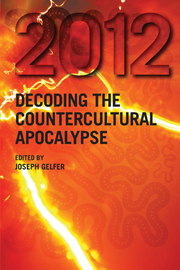Book contents
- Frontmatter
- Contents
- Contributors
- Preface
- 1 Introduction
- 2 The 2012 Phenomenon: New Uses for an Ancient Maya Calendar
- 3 Maya Prophecies, 2012 and the Problematic Nature of Truth
- 4 Mayanism Comes of (New) Age
- 5 The 2012 Milieu? Hybridity, Diversity and Stigmatised Knowledge
- 6 Chichén Itzá and Chicken Little: How Pseudosciences Embraced 2012
- 7 Roland Emmerich's 2012: A Simple Truth
- 8 The 2012 Movement, Visionary Arts and Psytrance Culture
- 9 In a Prophetic Voice: Australasia 2012
- 10 Approaching 2012: Modern Misconceptions versus Reconstructing Ancient Maya Perspectives
- Notes
- Index
7 - Roland Emmerich's 2012: A Simple Truth
- Frontmatter
- Contents
- Contributors
- Preface
- 1 Introduction
- 2 The 2012 Phenomenon: New Uses for an Ancient Maya Calendar
- 3 Maya Prophecies, 2012 and the Problematic Nature of Truth
- 4 Mayanism Comes of (New) Age
- 5 The 2012 Milieu? Hybridity, Diversity and Stigmatised Knowledge
- 6 Chichén Itzá and Chicken Little: How Pseudosciences Embraced 2012
- 7 Roland Emmerich's 2012: A Simple Truth
- 8 The 2012 Movement, Visionary Arts and Psytrance Culture
- 9 In a Prophetic Voice: Australasia 2012
- 10 Approaching 2012: Modern Misconceptions versus Reconstructing Ancient Maya Perspectives
- Notes
- Index
Summary
Roland Emmerich's 2012 has been billed as “the Mother of all disaster movies.” A tough billing. End-of-the-world movies have never really been out of vogue in cinema, and right now, seem more plentiful than ever. 2012 shares a box office release window of only four months, for instance, with Legion (Scott Stewart), The Road (John Hillcoat), and Zombieland (Ruben Fleischer). And while a nice distinction between disaster, the end of the world, and apocalypse has never been in vogue in Hollywood, as it has in academia, the fundamental and quite simple question must nevertheless remain the same: why do we go to see them? I cannot agree with the tabloid dismissive that would cite an American obsession with “blowing things up.” 2012 is a far better film than that, and may very well inarguably fulfil Emmerich's candidly stated goal of capping a career in epic disaster— a career including Independence Day (1996), The Day after Tomorrow (2004), and 10,000 BC (2008)—with his “biggest and best.”1 Indeed, 2012 does much to earn its billing with spectacular special effects (as promised), a decent script, and some ethical depth. It also firmly ties together a set of contexts with insistent cultural currency, from the generic staples of conspiracy theory, religious sentiment, and popular legends like Atlantis, to preoccupations more recently boiling up in the popular imagination, including ecological disaster and a renewed interest in survivalism.
- Type
- Chapter
- Information
- 2012Decoding the Countercultural Apocalypse, pp. 108 - 122Publisher: Acumen PublishingPrint publication year: 2012



